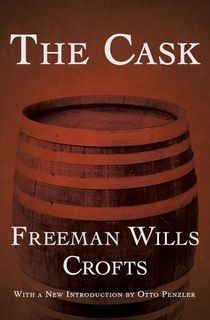When Freeman Wills Crofts’ fourth novel The Groote Park Mystery was published a century ago, one American critic hailed it as “The most exciting detective story since The Hound of the Baskervilles”. While that may be stretching things a little, the work of this prolific Irish crime writer is well worth discovering.
Freeman Wills Crofts was greatly admired during the heyday of the Golden Age of British Detective Fiction. He was noted for the scientific exactitude of his methods, the logical procedures of his detectives, and the tightness of his intricate plots. Dorothy L. Sayers called him “our cunningest fitter of jig-saws”, while Raymond Chandler concluded that Crofts was “the soundest builder of them all”.
In the 1920s and 1930s, Crofts was considered the equal of Sayers and Agatha Christie (who included a parody of Crofts’ Inspector French in Partners in Crime). His annual mystery novel was as eagerly anticipated as any featuring Lord Peter Wimsey, Miss Marple, or Hercule Poirot. Crofts topped the best-seller lists and won critical acclaim.
Yet following the author’s death in 1957, Crofts’ name slowly faded from memory. Most of his books are still in print, yet they sell only a fraction of those of The First Ladies of Crime. There are no all-star cast films of his novels, no internationally syndicated BBC serials.
The reason for Crofts’ fall is a simple one—his books lack the flash and glamour of the work of Christie, Sayers, and Sir Arthur Conan Doyle. His most famous creation, Inspector Joseph French is a jobbing English policeman, not an eccentric amateur sleuth. He is dogged and hardworking. He has no time for playing the violin, eating caviar, or whitening his spats.
In Crofts’ books, the detective follows actual police methods. He interviews suspects one at a time. He sifts the evidence carefully. It is the opposite of flamboyant. Crofts captures the plodding mundanity of actual police work. In some ways, the books seem more modern than those of his contemporaries. They are the godfather of the police procedural. Crofts has more in common with Ed McBain than Dorothy L. Sayers.

photo of Freeman Wills Crofts
Crofts’ background fed into his work. Born in Dublin in 1879, he left school at seventeen to take up an apprenticeship on the Belfast & County Railway. Crofts became a railroad engineer and a greatly respected one. Perhaps that’s why trains feature so often in his work and his plots are constructed as carefully as bridges.
Crofts wrote his first mystery novel in 1916. He did it to pass the time while convalescing after a debilitating illness. When it was finished, he put it away and went back to work. In 1919 he took it out again and, re-reading it, found that it was nowhere near as bad as he’d imagined. He sent if off to a London publisher. It was accepted immediately. Published in 1920, The Cask was hailed as a detective classic.

The Cask
For the next nine years, Crofts combined writing with his full-time job as a rail engineer. His greatest influence was probably R. Austin Freeman, whose great creation, forensic pathologist Dr. Thorndyke, solved crimes that often hinged on very precise scientific facts.
Crofts became a master of “the unbreakable alibi” story, featuring a brilliant criminal who thinks they have committed a crime for which they can never be caught.
In The Groote Park Mystery the death of two men by railway tracks, one in South Africa and one in Scotland, sees the hero Crawley cunningly stitched into the position of chief suspect by an unseen and evil foe. After Crawley is arrested, his fiancée and lawyer, aided by Inspector Ross, must fight to prove his innocence. Set mainly in the Scottish Highlands—which Crofts evidently knew and loved – it’s a taut and fast-paced mystery with plenty of whistling steam engines, heather, and mountain grandeur.

The Groote Park Murder
The following year Crofts introduced Inspector Joseph French to the world in Inspector French’s Greatest Case. Inspector French is a Scotland Yard detective. Happily married and entirely conventional, French battles no demons, conceals no dark personal secrets, and writes no poetry.
In his debut, the ordinary Inspector French tackles a diamond robbery in London’s Hatton Garden, though the investigation sees him roaring across Europe from Amsterdam to Switzerland to Barcelona and Portugal (all by train, naturally).

Inspector French’s Greatest Case
The polite, well-mannered Inspector French would go on to feature in 29 novels and numerous short stories. The 1936 mystery The Loss of the Jane Vosper in which French investigates the sinking of a cargo ship has some claim to being the first real police procedural.

The Loss of the Jane Vosper
By 1929 Crofts felt confident enough to start writing full-time. He quit his job in the north of Ireland and moved to the southern English county of Surrey—the sort of smart, well-tended, and genteel countryside where Golden Age Mysteries tend to happen.
He continued to write a novel every year. As the decades rolled on perhaps his plots got a little looser, and—a deeply religious man—he was at times wont to sermonize a tad too much, but his early work remains a benchmark for puzzle mysteries—each one as perfectly put together, logical and baffling as a Rubik’s Cube.



